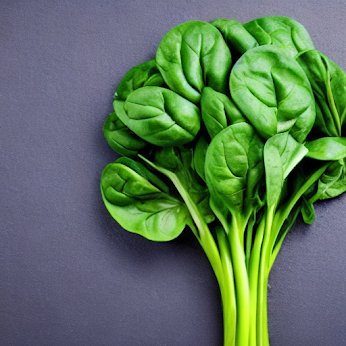Why Spinach is the Ultimate Superfood for Brain Function
Spinach has long been known as a nutritional powerhouse, and for good reason. This leafy green is packed with vitamins and minerals that benefit overall health, but it has also been shown to be a particularly effective superfood for brain function. From enhancing cognitive performance to reducing the risk of age-related cognitive decline, spinach’s brain-boosting properties are hard to ignore. In this article, we will explore the many ways in which spinach supports brain health and examine the scientific evidence behind these claims. Whether you’re looking to improve your memory, focus, or overall cognitive function, spinach may be the ultimate superfood for your brain.

1. Introduction to Spinach as a Superfood for Brain Function
What Makes a Food a “Superfood”?
With so many different foods touted as superfoods for their alleged ability to boost health and wellness, it can be hard to know where to start. However, when it comes to brain function, there is one food that stands above the rest: spinach.
But what exactly makes a food a superfood in the first place? Generally, this term refers to any food that is especially nutrient-dense and packed with beneficial compounds and properties — basically, foods that offer a ton of health benefits with relatively few drawbacks. Spinach certainly fits this description.
The Brain-Boosting Properties of Spinach
So why is spinach so great for your brain? For starters, this leafy green is high in a number of different nutrients and compounds that have been shown to support cognitive function and mental health in various ways. From antioxidants to anti-inflammatory compounds and much more, spinach is a powerhouse when it comes to brain health.
2. Nutritional Properties of Spinach that Benefit Brain Health
The Nutritional Content of Spinach
Spinach is loaded with a wide variety of vitamins, minerals, and other nutrients that are essential for overall health and wellness — many of which are particularly beneficial for brain function. For example, spinach is a great source of iron, which is important for maintaining healthy blood flow and oxygen delivery to the brain. It is also high in folate, which plays a key role in nerve function and brain development.
How Spinach Compares to Other Brain-Boosting Foods
While there are certainly other foods that can support brain function, spinach stands out due to its impressive combination of nutrients and compounds. For example, blueberries are often touted for their brain-boosting properties due to their high levels of antioxidants, but they lack many of the other nutrients found in spinach that can also support cognitive function.
3. Spinach as a Source of Antioxidants and Anti-Inflammatory Compounds
The Role of Antioxidants in Brain Function
One of the key ways that spinach supports brain health is through its high levels of antioxidants. These are compounds that help to protect the brain from damage caused by free radicals, which can lead to inflammation and oxidative stress. By neutralizing these harmful compounds, antioxidants can help to prevent or even reverse damage to brain cells.
Anti-Inflammatory Compounds and Their Impact on Brain Health
In addition to antioxidants, spinach also contains a number of anti-inflammatory compounds that can help to reduce inflammation throughout the body — including in the brain. Chronic inflammation is a major contributor to a variety of health problems, including depression, anxiety, and cognitive decline, so reducing inflammation is key to maintaining optimal brain health.
4. How Spinach Supports Cognitive Function and Memory
The Relationship Between Nutrition and Cognitive Function
There is a growing body of research showing that nutrition plays a major role in cognitive function and memory. By providing the brain with the nutrients and compounds it needs to function optimally, we can help to support mental clarity, focus, and memory recall.
Research on Spinach and Cognitive Performance
Studies have shown that eating spinach can have a number of beneficial effects on cognitive function and memory. For example, one study found that eating spinach was associated with a 40% reduction in the risk of developing age-related cognitive decline. Other research has suggested that consuming spinach can help to improve attention and mental performance in both adults and children.
All in all, spinach is a truly impressive superfood for brain function. By incorporating more of this leafy green into your diet, you can help to support optimal cognitive function, mental clarity, and overall brain health. So why not toss some spinach into your next salad or smoothie and see how it makes you feel? Your brain will thank you!
5. The Role of Spinach in Reducing the Risk of Age-Related Cognitive Decline
The Importance of Brain Health Across the Lifespan
As we age, our brains naturally experience some cognitive decline. This can manifest as issues with memory, attention span, and decision-making abilities. However, certain lifestyle factors, including diet, can help mitigate these effects. By choosing nutrient-dense foods that support brain health, we can reduce the risk of age-related cognitive decline.
How Spinach Can Help Protect Against Cognitive Decline
Spinach is a powerhouse when it comes to brain health. This leafy green vegetable is rich in antioxidants, which can help protect against oxidative stress in the brain. Additionally, spinach is high in vitamin K, which has been linked to better cognitive function in older adults. Finally, spinach is a great source of lutein, a compound that has been shown to improve memory and executive function.
6. Spinach as a Versatile Ingredient for Brain-Boosting Recipes
Easy Ways to Incorporate Spinach into Your Diet
Fortunately, incorporating spinach into your diet is easy! This versatile vegetable can be eaten raw or cooked and pairs well with a variety of flavors. Try adding spinach to smoothies, salads, omelets, or as a side dish with dinner.
Recipe Ideas for Brain-Boosting Meals and Snacks
Looking for some inspiration? Try making a spinach and feta omelet for breakfast, a Greek spinach salad for lunch, or sautéed spinach with garlic for a simple and flavorful dinner side dish. For snacks, try making spinach artichoke dip with whole grain crackers, or blending spinach into a fruit smoothie for added nutrients.
7. Conclusion: Incorporating Spinach into Your Diet for Optimal Brain Health
The Takeaway: Spinach is a Nutrient-Rich Superfood for Brain Function
Incorporating spinach into your diet is a simple and effective way to support brain health across the lifespan. Its high levels of antioxidants, vitamin K, and lutein make it an ideal superfood for reducing the risk of age-related cognitive decline. With its versatility and delicious flavor, spinach is a great addition to any meal or snack. So, next time you’re at the grocery store, be sure to pick up some fresh spinach and give your brain the nutrients it needs to function at its best! Incorporating spinach into your diet is a simple and delicious way to boost your brain health. Whether you enjoy it raw in a salad, sautéed as a side dish, or blended into a smoothie, this versatile superfood offers a variety of nutritional benefits that support cognitive function and overall brain health. By making spinach a staple in your diet, you can help protect your brain against age-related decline and maintain optimal cognitive performance throughout your lifespan.
FAQ
How much spinach should I eat to support brain function?
There is no set amount of spinach that is guaranteed to enhance brain function, as individual nutritional needs vary. However, the general recommendation is to consume at least 1-2 cups of spinach per day to reap its brain-boosting benefits.
Can spinach supplements provide the same benefits as eating spinach?
While spinach supplements are available, they may not provide the same benefits as eating whole foods. It’s best to consume spinach in its natural form to ensure that you’re getting all of its essential nutrients and phytochemicals.
What are some easy ways to incorporate spinach into my diet?
Spinach is a versatile ingredient that can be added to a variety of dishes. Try tossing a handful of spinach into a smoothie, sautéing it as a side dish, or using it as a base for a salad. You can also substitute spinach for other greens in recipes like lasagna, omelets, and sandwiches.
Are there any potential drawbacks to eating spinach?
While spinach is generally considered safe and beneficial for health, it is high in oxalates, which can contribute to the formation of kidney stones in some individuals. If you have a history of kidney stones or other kidney issues, it’s best to speak with your doctor before consuming large amounts of spinach.
